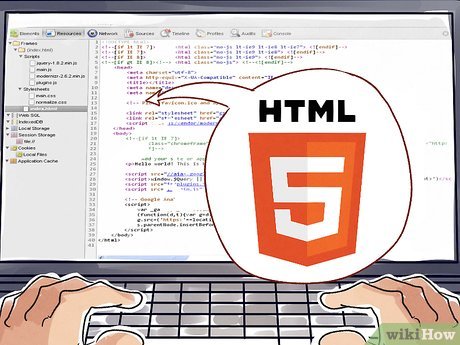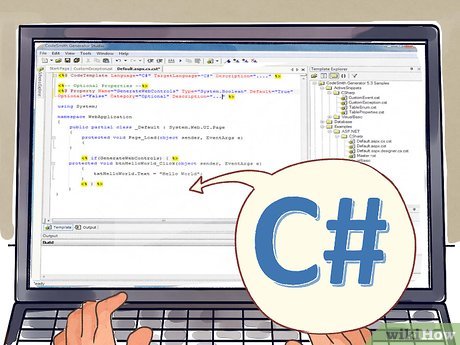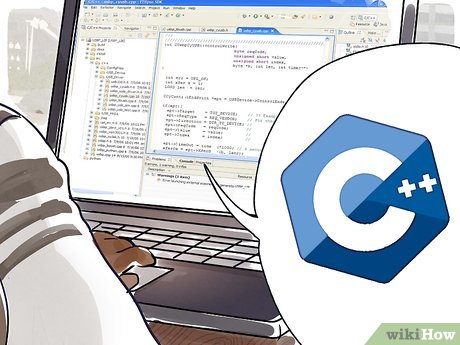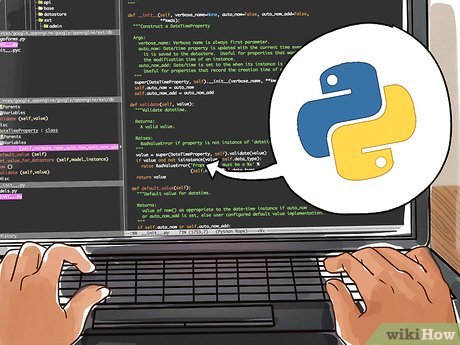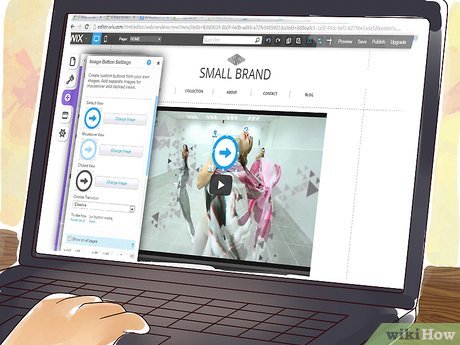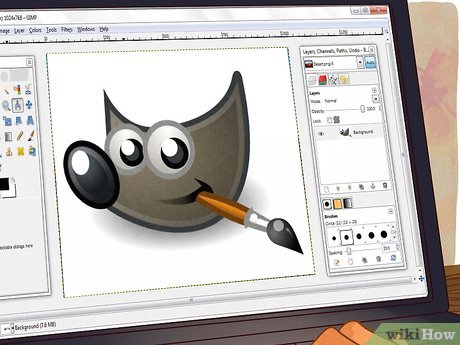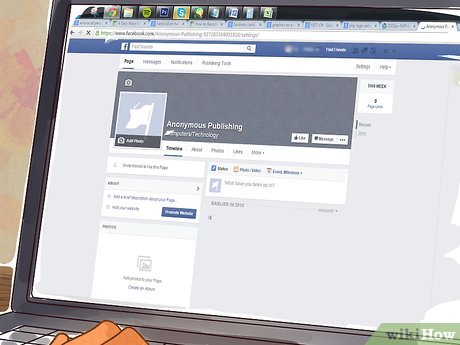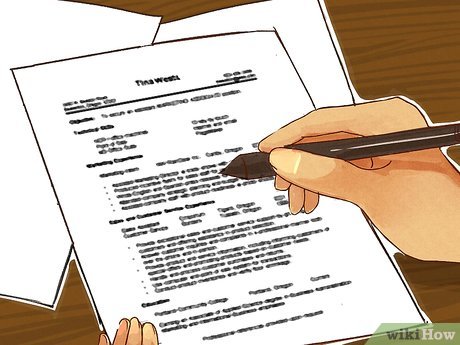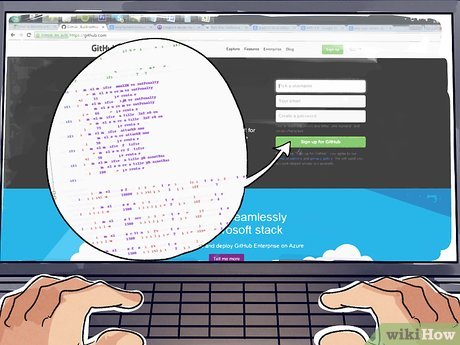How to Become a Web Developer
Part 1 of 5:
Understanding What is Required to Become a Web Developer
-
 Know what employers are looking for. Most companies wishing to hire a web developer will advertise for a person who has several qualifications. [2]
Know what employers are looking for. Most companies wishing to hire a web developer will advertise for a person who has several qualifications. [2]- Many employers will want a web developer to hold a Bachelors degree in computer science.
- Computer science degrees prepare an individual by teaching them the skills needed for web development: programming, web design, database management, networking, and mathematics.
- In lieu of getting a degree, many web developers hold professional certifications. You can obtain these from community colleges, continuing education services, and several technology companies.
- For example, Microsoft offers a web development training course that requires you to pass an exam and hold 2-3 years of work experience.
- While having a degree or certification is most desirable, there are many freelance web developers in the market who are building successful business.
-
 Understand what computer skills you need to become a web developer. Being able to design a basic website is the bare minimum you will need to be able to do. [3]
Understand what computer skills you need to become a web developer. Being able to design a basic website is the bare minimum you will need to be able to do. [3]- You need to know how the web works and how to program.
- There are many different programming languages that a good web developer should have knowledge of. You will need to know how to code in different programming languages and when to use them.
- New programming languages and interfaces are appearing everyday. You need to keep up with the trends in technology to move forward in this field.
- You will need to know some basic aspects of design: color theory, grid blocking, fonts etc.
- While your job isn't primarily to design graphics, you should know how to make a website or app look attractive and be user friendly at the same time.
-
 Understand that web development is a very demanding career. You will need to have the interpersonal skills to relate to clients as well as to handle stress and a busy work environment.[4]
Understand that web development is a very demanding career. You will need to have the interpersonal skills to relate to clients as well as to handle stress and a busy work environment.[4]- Interpersonal skills are a very important aspect of the field of web development. You will be interfacing with clients, co-workers and companies on a daily basis.
- Knowing how to handle a person who is impatient or who doesn't understand technology is essential.
- You may be dealing with difficult clients or people who need some extra help in learning how to use the technology you are developing.
- You will also need stress management and time management skills. Being a web developer is very demanding.
- You may be working on several projects at a time and have hard deadlines.
Part 2 of 5:
Learning About Programming Languages
-
 Understand the purpose and function of programming languages and platforms. Without these, the web and other programs wouldn't function properly. [5]
Understand the purpose and function of programming languages and platforms. Without these, the web and other programs wouldn't function properly. [5]- Programming languages and platforms are what developers use to create applications, scripts, or other sets of instructions for computers to follow.
- There are dozens of different programming languages.
- Each language uses a different platform or program to write scripts, programs, and instructions.
-
 Become familiar with HTML. This is one of the simplest and most commonly used programming languages for websites. [6]
Become familiar with HTML. This is one of the simplest and most commonly used programming languages for websites. [6]- Most people can learn the basics of HTML in an afternoon using one of the many online tutorials available.
- HTML is a language that consists of multiple short codes are typed into a text document. It has its own grammar and syntax just like any language.
- HTML stands for HyperText Markup Language.
- Hypertext is the method by which you move around the internet. You click on a link, which is hypertext that directs you from one page to another.
- When you write in HTML, you will use a series of tags. These tags tell the text what to do: be italicized, link to another page, be a bulleted point etc.
- When you write HTML in a text file, it is then saved as an html file. This file is then opened by a browser, like Google Chrome or Firefox.
- Your browser reads the file and translates your code into visual form. That's the website you see.
- To utilize HTML, you can use a simple text editor or a powerful HTML editing tool like HTML Kit.
- Other programming languages work similarly, but use different syntax and tags. Other languages are available for more complicated types of webpages.
-
 Learn about Java. This is a very commonly used programming language for web developers. [7]
Learn about Java. This is a very commonly used programming language for web developers. [7]- The main goal of Java is to allow web developers to write a script or set of instructions for an application.
- This language allows application writers to "write once, run anywhere".
- Some popular websites that use this language are Netflix, Edmunds and Zappos.
- Some of the most popular tools for writing and coding in Java are JSON and CORE.
-
 Develop skills using NET/ C#. This is essential if you work on Microsoft based systems. [8]
Develop skills using NET/ C#. This is essential if you work on Microsoft based systems. [8]- This programming language was created for Microsoft platforms.
- Popular websites that use this as a development tool are ExactTarget, Comcast, and XBOX.
- Development tools that will help you write in NET/C# are Flippy, SQL Helper, Imagehandler, and CodeSmith.
- Other tools that can check your code and help to run your apps more smoothly are FxCop, Regulator, NUnit, and NDoc.
-
 Think about learning PHP. This is another language that is especially suited for web development. [9][10]
Think about learning PHP. This is another language that is especially suited for web development. [9][10]- It is the most commonly used scripting language. [11]
- This language allows web developers to write quickly. This language is more flexible in its code than others. [12]
- Facebook, Tumblr, and Wikipedia utilize PHP as their programming language.
- Some of the top tools for using PHP are Slim.PHP, Secureimage, and Webgrind.
- Other tools for PHP include, but aren't limited to, Scavenger, PHP DOX, and PHP_Debug. Multiple testers, debuggers, and documenters are available for use with PHP. [13]
-
 Consider developing skills in writing C++ code. This language is mostly used for systems programming. [14]
Consider developing skills in writing C++ code. This language is mostly used for systems programming. [14]- This programming language is easy to use and has flexibility in its code.
- Popular websites that use C++ are JPMorgan Chase, DIRECTTV, and Sony.
- There are multiple tools that can help you code in C++, such as Doxygen, Graphviz, and Mscgen.
- Eclipse is another popular tool for using C++. [15]
-
 Learn how to code in Python. This is a very popular coding language used by many popular websites. [16]
Learn how to code in Python. This is a very popular coding language used by many popular websites. [16]- Python is a programming language known for its ease of use that allows developers to quickly create code and integrate systems.
- This language has programming syntax that is easy to read and follow. This reduces the cost of program maintenance. [17]
- Some of the websites that you probably use everyday are Python based, such as Google and Youtube.
- Some of the tools you can try for working with Python are Komodo Edit IDE, PyCharm IDE, and Eclipse with PyDev.
Part 3 of 5:
Learning about Graphic Design
-
 Understand the basics of graphics on a webpage. Most web developers don't do their own graphic design, but its important to know the basics. [18]
Understand the basics of graphics on a webpage. Most web developers don't do their own graphic design, but its important to know the basics. [18]- You should know how to crop a graphic, resize it, change color scheme, and add text.
- There are many different graphic and photo editing apps and programs for you to use.
- Each has their own interface and methods.
- While most web developers at larger companies don't do the graphic design for apps and pages, its important to have a good general sense of basic graphic editing.
- Many web developers will end up doing some basic graphic editing, especially at smaller firms or if they are self-employed.
-
 Download free graphic editing software. This will allow you to practice and get oriented with simple graphic editing.
Download free graphic editing software. This will allow you to practice and get oriented with simple graphic editing.- Free editing software suites such as GIMP and Inkscape are available for download.
- There are number of online tutorial for GIMP and Inkscape. [19][20]
- These free editing software packages allow you to do the basics of graphic and photo editing.
- With GIMP and Inkscape you can crop and resize a photo or graphic, add shapes and text, remove red-eye and change the colors of your graphic.
-
 Practice adding images to a website. Create a simple website based on a topic you are interested in.
Practice adding images to a website. Create a simple website based on a topic you are interested in.- Use your HTML coding skills to place simple images and graphics onto the website.
- Use GIMP or Inkscape to edit the images.
- Check the website to see how changes in your images affect the way the site looks.
- You will have to practice and play with options to find out the ways you prefer to edit images.
- Once you have a client, you should be able to edit images and graphics according to their needs.
Part 4 of 5:
Advertising Your Skills
-
 Plan several websites. This is something that you can show potential clients to demonstrate your skills.
Plan several websites. This is something that you can show potential clients to demonstrate your skills.- You should make several different types of websites: one for displaying images such as artwork or photos and videos, one for a business and another for a blog, hobby, or interest.
- These types of websites are what you will commonly encounter as a web developer.
- Create a mock business page including the type of business it is, what products and services are sold, images of potential work, a products and services page, and contact page.
- Make your own personal website, including what types of programming you are familiar with, your rates, and links to any websites you have worked on or created.
- This will allow clients to see your work.
- Build a blog site where users can use an interface to add content.
- Work with various languages so your potential clients can see what you can work with.
-
 Make business cards. Hand them out at events.
Make business cards. Hand them out at events.- Make sure you have a link to a personal or business website for your freelance web development.
- Provide contact information on your card.
- Provide links to websites you have worked on so potential clients can see your work.
-
 Beef up your social media presence. Create a page about your business and what kinds of web development you specialize in.
Beef up your social media presence. Create a page about your business and what kinds of web development you specialize in.- Just like a business website, this is a very important step in getting business for yourself.
- Try making a Facebook page for your business, and include what types of programming you can do, your rates for services, and your contact information.
- Create a Twitter account and give updates and links to sites you are working on.
- Make sure you have a Google + page or blog about what you are working on and doing with web development.
- Use LinkedIn to communicate with other industry professionals.
-
 Advertise online and in newspapers. Once you are comfortable with doing a wide range of web development services, you should advertise widely.
Advertise online and in newspapers. Once you are comfortable with doing a wide range of web development services, you should advertise widely.- Make an ad on Craigslist under the Services page for your area.
- Make sure to include links to sites you have worked on and some contact information.
- Try taking an ad out in local newspapers and magazines.
- This might get your business some local development from local social groups, charities, and business owners looking to build or improve their websites.
Part 5 of 5:
Getting A Job as A Web Developer
-
 Prepare and update your curriculum vitae or resume. Include any experience, even voluntary, that you have designing and programming for websites or apps. [21]
Prepare and update your curriculum vitae or resume. Include any experience, even voluntary, that you have designing and programming for websites or apps. [21]- It is important that you are honest when developing your CV. Don't include false experience or exaggerate.
- Steer clear of industry jargon and buzzwords. Present clearly what your experience is with out using words such as "synergy" or "creative".
- Include testimonials of your work and links to code or websites you have developed.
- Have a friend or colleague review your CV before you apply to jobs.
- Put your CV online after it has been completed or updated. Try using sites like LinkedIn or Career 2.0.
- Ask any industry connections you have to look at your CV to see if they know of any opportunities.
-
 Put some of the code you have written online. An online presence for a web developer is vital to a successful career. [22]
Put some of the code you have written online. An online presence for a web developer is vital to a successful career. [22]- Put out a side project onto collaborative sites like GitHub.
- Contribute to open sourced projects on GitHub and similar websites.
- A prospective employer who sees that a candidate works with others on a web project in their spare time will be an attractive potential employee.
- Put your highest quality code on your online profiles.
- Once you have written some code or contributed to a project, you can put this on your CV.
- You could also start a blog about projects you are working on or trends in web development. Put a link to this on you CV. Potential employers will often look to see if a candidate is keeping up to date on trends and projects in the field.
-
 Research tech companies. Especially if you are contacted by a recruiter or have applied to a specific job, it is important to know the ins and outs of a company.[23]
Research tech companies. Especially if you are contacted by a recruiter or have applied to a specific job, it is important to know the ins and outs of a company.[23]- Know how long a company has been in operation.
- Make sure you understand the goals and mission of the company.
- Become familiar with the companies products or services.
- A potential employer won't want to interview someone who clearly does not know what his company does or how they operate.
-
 Spend time on technical tests. Many companies will want you to take a technical competency test before or after an interview.[24]
Spend time on technical tests. Many companies will want you to take a technical competency test before or after an interview.[24]- Take this seriously, even if the task seems trivial.
- Companies will want to see if you can code in a particular language or develop a specific type of website.
- Put as much effort into the exam as you can. You will want to make sure you don't have any errors in your code and that it compiles correctly.
- Use an online test to deploy your code for the test. This will show a potential employer that you know how to deploy code you have written.
-
 Go to any interviews prepared. Do some of your own research about the company climate.[25]
Go to any interviews prepared. Do some of your own research about the company climate.[25]- You should try to deduce what the company dress code is, the hours required, and if you will need to travel.
- Arrive 15 minutes early for an interview. This will show you are punctual and have time management skills.
- Prepare several questions of your own to ask an interviewer. You should ask questions about the work environment, company culture, what types of projects you will be expected to work on etc.
- Going to an interview with questions about the job is a good indicator to an employer that you have thought carefully about the interview and the job.
- Avoid common interview pitfalls. Don't ask about salary or badmouth past employers and colleagues. Don't exaggerate your experience when asked about projects you have worked on.
Share by
Micah Soto
Update 24 March 2020




